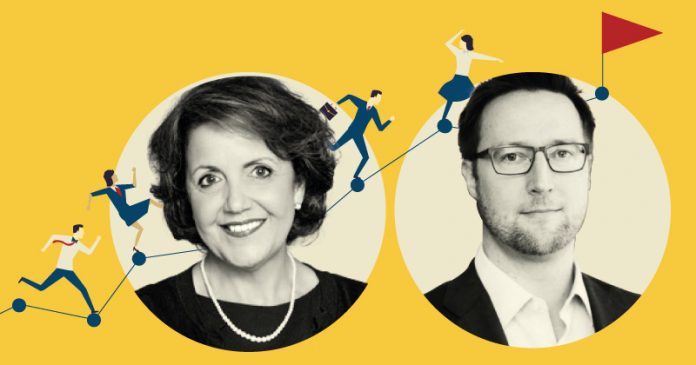Having hosted programmes with participants from 16 countries across 4 continents and from more than 200 organisations in the past 10 years, the Center for Leadership at Florida International University (FIU) continues to fulfill its work and passion of delivering the very best results for leaders and their organisations. To know more about the center’s top-ranked executive programmes on leadership development, we spoke with Director of Strategy, Dr. Mayra Beers ,and Academic Director, Dr. Nathan Hiller.
Good day, Dr. Beers and Dr. Hiller! Thank you for taking the time to talk to us. To start this interview, would you share with us what do successful directors and leadership mentors like you have in mind every single day? What do you eagerly anticipate?
Mayra: What do leaders need to be more effective and build a stronger society? Every day I look forward to thinking about how we as a Center can have an even greater impact by moving the conversation around leadership and leadership development forward. We answer that question through continuous research and testing that research against its practical application.
Nathan: Getting our hands dirty in helping individuals, teams, and organisations build their leadership capacity – it is what energises and drives our research, our leadership development programmes, and our interactions with client organisations.
As Directors of the Center for Leadership, what do you focus on individually and together toward the Center’s development and success?
While we bring dynamic and different perspectives to our work, there is also a high degree of alignment in driving forward a single strategy for the Center: to provide leaders and organisations with insights, reflection, and enhanced skills that will maximise their effectiveness and impact. This single focus has allowed us to succeed in providing hundreds of senior executives with practical strategies they have utilised on the job to improve their leadership. And it resonates on a global, cross-cultural scale; over the past 10 years we have hosted programmes with participants from 16 countries across 4 continents and from more than 200 organisations.
The Center for Leadership at Florida International University’s mission is to provide leadership development that transforms and emboldens individuals and organisations to positively impact our world.
Leadership plays a vital role in driving transformational change within organisations. At FIU’s Center for Leadership, it is your work and passion to develop leadership that is effective in today’s complex business landscape. How do you fulfill such an endeavour?
Leadership is personal. We design state-of-the-art research-based leadership development programmes that tap into what each leader uniquely brings to their leadership roles and harnesses this in a way that can deliver the very best results for their teams and their organisations. Our clear emphasis on research ensures that we stay grounded, and our careful integration of research with practical insights and application ensures that it is relevant.
Over the years, you have helped lots of executives and managers develop their leadership skills. Could you give us a background of your highly acknowledged executive programmes on leadership development which even made you top-ranked in the open-enrollment category?
Our programmes are designed around two pivotal themes that underpin effective leadership: self-insight and developable skills. These two themes very intentionally form the core of every programme we design. We also design session content around the five meta-competencies identified by our own research, which fit well with almost every organisation’s leadership competency model. They are: leading self, leading others, providing strategic focus, connecting with others and delivering results. Each of our programmes are slightly different, but they all focus on these themes as the most salient and practical for our participants.
Industry leaders invest in management training to become more effective and efficient in their functions. How do you make sure that your approach to leadership development helps them address the challenges facing their organisation?
Before each programme we ask leaders about their most pressing challenges. We address some of these areas during the programme and focus the action planning work that is part of every programme around how best to address those issues. These ideas are further fleshed out through the dynamic conversations with peers in the cohort, with executive coaches available to participants, and through faculty expertise.
Above all, the learning must be applicable and of value to each participant. We ensure this outcome in two ways. First, the Center uses a comprehensive system of evaluations that ask for feedback on every session and on the overall programme. These evaluations allow us to make any relevant adjustments or enhance sessions that participants find most salient. Second, every participant in every programme creates an action plan that they expect to implement immediately upon returning to their workplace.
Seeing leaders succeed in their endeavours is indeed fulfilling. What’s the most significant impact your programmes have brought to leaders from different industries? What have been the remarkable achievements and best feedback that you have received?
“This programme changed the way I view my role as a leader.” Or “my colleagues have noticed that I am more strategic and effective in leading.” Testimonials like those speak to the power of a leadership development programme that focuses on the individual and on small but powerful leadership adjustments that can have a massive impact.
We recently held an alumni event to which we invited program alumni going back over the past decade. The feedback we received and the significant attendance to that weekday morning event validated that the impact of the programmes is indeed long-lasting and enduring. Even ten years later, people showed up early in the morning to be part of a leadership community that impacted them as individuals.
Evidently, there are changes in leadership style as the world advances. What do you think are the features of a remarkable leader today?
Yes, how leadership is expressed changes over time, but some principles remain constant. A remarkable leader understands who she/he is and the impact of their leadership on those he/she leads. A remarkable leader is able to create a space in which those around him/her can succeed. Whether it is across cultures or across industries, working remotely or in close-knit teams, these principles can lay the groundwork for career-long success for leaders.
In your years of experience in this field, what’s the most interesting transformation you’ve witnessed? What are the biggest or common challenges that you have observed facing leaders today?
From a systems perspective – there are indeed some changes in the issues leaders face today. More is being asked of leaders (at all levels and in all organisations) than ever before. The burdens and expectations of leadership are high, and seem to be getting higher, from the pace of work to the challenge of being always on (and knowing how and when to purposefully turn off).
In terms of individual transformation – sometimes the transformation is subtle and occurs after our programme when the ideas and behaviours start marinating and the individual starts making gains by taking small steps and experimenting. Often these small changes have a huge impact. In other cases we literally see a significant transformation right before our eyes during a programme, when a lightbulb turns on. All of these transformations, big and small, are exciting – and we see it as a gift that our programmes can many times play a part in true and meaningful change and growth. We should expect it by now, but it never ceases to amaze us.
For those aspiring to become successful leaders, what are the fundamentals that are associated with leadership roles? What advice would you offer them?
Leading without a “rule book” means being able to handle the ever-changing world of our global business environment. The best advice is probably among the oldest advice; Aristotle probably expressed it best, “knowing self is the beginning of wisdom.” Understanding ourselves – our biases and preferences, our triggers and talents – will allow us to leverage situations not because it makes us feel good or fulfilled, but because it is the right thing to do for ourselves and our organisations in a particular situation.
What’s the biggest mistake you see leaders make and how can they avoid it or recover from it?
Mayra: Leaders often rely on heuristics that have worked in the past; but the rules sometimes change. Leaders have to be agile and strategic in the face of “new” challenges and recognise their opportunities that look vastly dissimilar from their business-as-usual work. Being aware that many times leadership does not come with a static rule book, and thinking about the impact of new technologies, new markets, and new business models requires alertness and the willingness to seek divergent points of view. This is one of the reasons we do not rely on case studies in our programmes – what got you here will probably not get you there.
Nathan: A second area we often see is that leaders do not prioritise spending real time developing a clear and compelling vision for their teams and organisations. Leaders spend less than one percent of their time on what clearly should be the most compelling part of leadership: creating and conveying a vision that captures purpose and commitment from their followers. We have thought long and hard about this aspect of leadership and have developed a session on how to build and communicate a compelling set of talking points that sets out long-term goals and a way forward – and the need to revisit that vision at regular intervals. This practice is critical for maintaining effectiveness and programme participants are guided through a protocol for crafting a vision during the programme.
Like other professions, being the directors of the Center for Leadership can be exhausting sometimes. How do you make sure that you maintain a healthy lifestyle, both in your professional and personal lives? What’s your daily grind?
It is undeniable we think about the work of The Center most of the time; but we have also carefully tried to practice what we preach: healthy leaders make for a healthy and more productive workplace. We try to instill that concept as one of our workplace values and encourage staff to do the same. While our days are taken up with administrative duties and teaching, expanding our work as a research center at a research university, and ensuring that we continue to impact individuals, organisations, and the community at large, it is important to us that we not lose sight of personal goals and aspirations. Like most leaders with whom we work, all the demands on our time can be rather daunting, but at least in our case, it is also extremely rewarding.
What does success mean to you? Any message you wish to share with your readers?
Interesting that you pose this question. When we do custom work that is one of the first questions we ask our clients. “If we are successful in delivering this programme, what would the organisation (or team) look like as a result? What would be different?” Often, leaders are not able to answer that question well. As leaders we get so caught up in the “doing” that we don’t often stop to consider the big picture. If we could offer any message to your readers it would be to pause and think about what success looks like for them, whether at the professional or personal level – and then consider what it would take to get there.
Thank you very much, Dr. Beers and Dr. Hiller! A pleasure speaking with you.
About the Interviewees
 Dr. Mayra Beers is Director of Strategy and John S. and James L. Knight Research Fellow for the Center of Leadership at Florida International University. She holds MA and Ph.D degrees from FIU and holds Certificates in African New World Studies and Latin American and Caribbean Studies. She is an active lifelong volunteer for numerous causes and especially for education-related activities.
Dr. Mayra Beers is Director of Strategy and John S. and James L. Knight Research Fellow for the Center of Leadership at Florida International University. She holds MA and Ph.D degrees from FIU and holds Certificates in African New World Studies and Latin American and Caribbean Studies. She is an active lifelong volunteer for numerous causes and especially for education-related activities.
Dr. Nathan Hiller is an Academic Director of the Center for Leadership and an Associate Professor of Management and International Business at Florida International University. He has held visiting faculty appointments at Cornell University of Washington, and has taught a graduate leadership course at Fundação Getulio Vargas (FGV) in Rio de Janiero. He received his Ph.D from The Pennsylvania University.






































